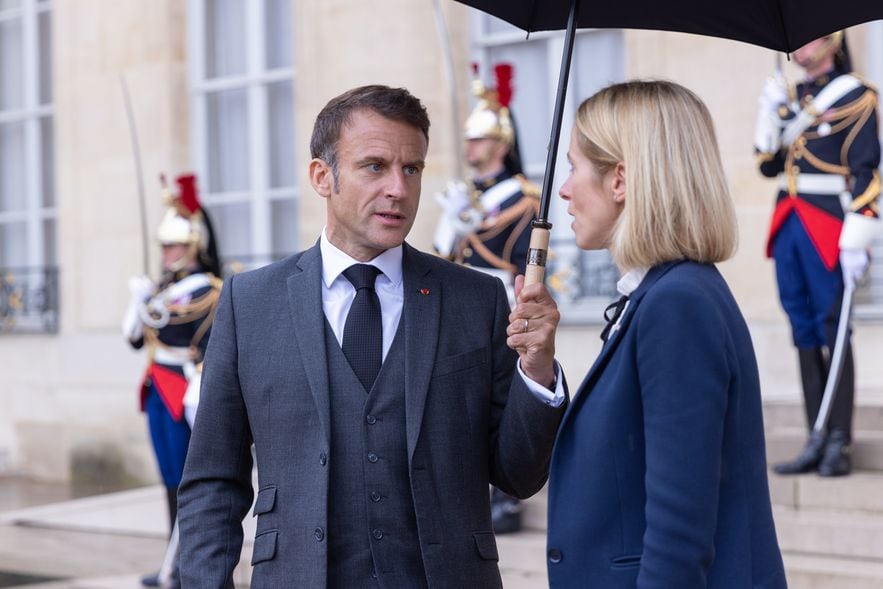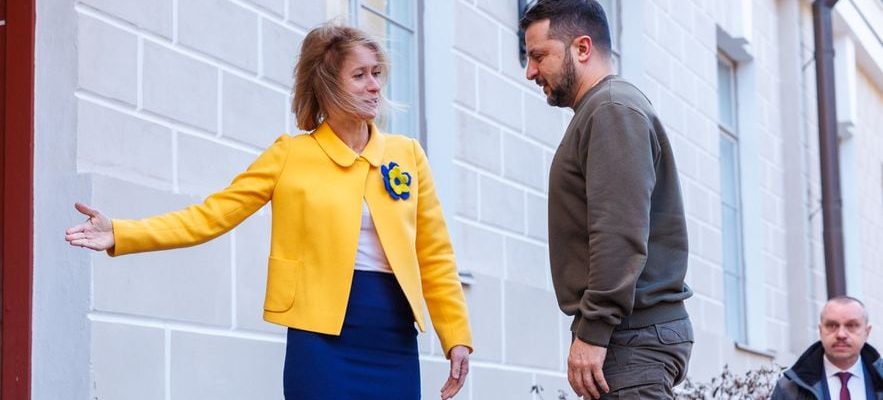When the Prime Minister of Estonia speaks about Russia, she knows what she is talking about. His own mother was deported to Siberia with her family by Stalin in 1949 when she was just a baby. Neighboring Russia, the Baltic republic, now populated by 1.3 million inhabitants, was in fact occupied by the Soviet Union for fifty years, until 1991. Head of center-right government since 2021, Kaja Kallas has been one of the most consistent supporters of Ukraine since the start of the conflict. His country also devotes 1.28% of its national budget to direct aid to kyiv, which places it, in proportion, in third position in the world, after Norway and Lithuania. While in Paris on May 2, the Prime Minister made no secret of her concerns.
L’Express: In Ukraine, the Russian army seems to be going through a good time. Some fear a breakthrough of the front by Putin’s soldiers. Are you worried?
Kaja Kallas: I have been concerned for six months since Ukraine did not receive the aid it was supposed to receive. Now that the American Congress has released this aid, the question is when it will reach its destination. We in Estonia sent all the military aid we could send. I hope others will do the same. I am frustrated that the Russians took advantage of the six months of blocking American aid to strengthen themselves and go on the offensive. At the same time, we may have been too optimistic in our expectations in 2023. So let’s avoid being too pessimistic in 2024.
What do you know about the situation on the front?
In Ukraine, morale is not at its highest because we are already in the third year of war and, for six months, weapons and ammunition have been reaching the front in dribs and drabs. However, the situation is slowly improving and things should move in this direction. I think that the Ukrainians will be able to resist in 2024 and that they will be able to push back the Russians in 2025. In February in Paris, we agreed to send more ammunition: we found and drew on stocks existing in different places around the world. We continue to release funds. Things are moving but they need to move faster.
In March 2023, you launched the European initiative “1 million shells” for Ukraine. Today, we are far from the goal…
Without giving exact figures, I can say that we had reached more than 50% of the objective, but these are pledges, not actual deliveries. It’s disappointing but, at the same time, I tell myself that without this ambitious proposal, there would have been no momentum at all. In any case, this initiative has highlighted our shortcomings. Today, everyone is trying to stimulate the defense industry to produce more and faster. We went through a phase of awakening. We are now aware of the weakness of our production capacities. Thus, the share of the European budget devoted to defense amounts to only 0.86%. It is insufficient.
Prime Minister of Estonia Kaja Kallas and President of Ukraine Volodymr Zelensky in January 12023 in Tallinn (Estonia)
© / Office of the Prime minister of Estonia
I meet a lot of people in the military industry and in politics. The former say that they lack firm state orders to plan for the future and they complain that defense budgets are not increasing significantly. The latter affirm that manufacturers should mobilize more quickly. In fact, it’s a chicken and the egg story… In my opinion, both sides should do more. Industry should take more risks and anticipate orders while governments should give clearer signals to stimulate production.
All this is hardly reassuring.
And there is another problem. Defense investments by the European Investment Bank are limited by laws that prohibit spending money on lethal equipment. With fourteen European prime ministers, we have therefore taken steps to lift this ban. In Estonia, we are doing things differently: we have created a Defense Investment Fund to enable tech start-ups – a very dynamic sector in our country – to move up a gear and innovate, particularly in matter of drones.
What do your secret services know about what the Russians are planning?
Moscow has increased its defense budget incredibly. It’s like 6% or something like that. The Russians have switched to a war economy. Their military industry runs at the pace of three-eighths. This means that, if Russia prevails in Ukraine, it will have a gigantic stockpile of usable weapons which, of course, it will be eager to use elsewhere in Europe in order to push its advantage. This should give pause to Europeans who feel little concerned or distant from the conflict in Ukraine.
Russia is building a ruthless war machine for decades to come. This topic does not only concern countries bordering Russia, like mine, but the whole of Europe. We are all part of NATO. However, in the event of aggression, Article 5 of the Atlantic Alliance will apply [il prévoit la solidarité des autres pays membres avec le pays agressé]. Everyone needs to think about it.
The United States, Germany, the United Kingdom, the Nordic countries, Poland and Canada are the main donor countries of aid to Ukraine. France is far behind. Spain and Italy even further. What do you think ?
It is the product of geography and history. Some colleagues from Southern Europe tell us: “Oh, but you are scaring people by repeating that we have to spend even more on European Defense.” But not talking about the Russian problem does not make it go away. On the contrary, we need to talk about the war in Ukraine and make more efforts. We Europeans are in the same boat. We must mobilize together.
What do you think of the interview with Macron in The Economist ?
She is very good. I read it and said to myself: “But those are my words! I would have said the exact same thing!” In short, Macron is Estonian! In his remarks, I particularly appreciate the idea of strategic ambiguity which consists of not immediately excluding the presence of French soldiers in Ukraine. Let’s leave Putin in uncertainty rather than announcing our intentions to him in advance, as has too often been the case since the start of the conflict. In short, I see myself perfectly in Macron’s words.

Estonian Prime Minister Kaja Kallas and French President Emmanuel Macron at the Elysée in October 2023
© / Office of the Prime minister of Estonia
War is essentially a battle between wills. Vladimir Putin seems determined to go all the way. How to stop it?
Its objective is extremely clear. This is why you need to pay attention to it. He simply wants to redefine the security architecture in Europe according to his own rules. He intends to impose the idea that conquering and colonizing a country other than his own is legitimate. This should alarm all European leaders because we are already seeing tensions rise in different parts of the world. The same thing happened in the 1930s with the invasion of Manchuria by Japan (1931), the annexation of Ethiopia by Italy (1934) and the forced attachment of Austria to the Germany (1938).
Looking back on history, we now know that all of these events were connected. Today we see tensions growing between Azerbaijan and Armenia, in Georgia, in the Middle East, in China Sea. From now on, it is Europe’s credibility that is at stake. All the countries in the world, on five continents, are watching us to see whether or not we are capable of allowing Ukraine to resist the Russian aggression. If this is not the case, the consequences will be incalculable.
Do you fear the progression of the far right in next month’s European elections?
Putin hopes that anti-European forces will advance. Russia will do everything to influence the vote in this direction. However, the extreme right generally has no program other than to oppose the power in place. She doesn’t offer anything. She just wants to destroy, not build. This is also Putin’s great design: he wants to shatter the European Union. To do this, he fuels divisions, sows discord, blows on the embers. He knows that we are weaker when we are divided. We see this with the Palestinian question which divides our societies.
The Russians are following and studying this closely. They are experts in social sciences. They look for sources of conflict to add fuel to the fire. Whenever they can, they contribute to hysterizing debates on social networks where everyone believes they have a truth that can be contained in a sentence, a slogan, a tweet. Personally, if someone claims to have a simple solution to a complex problem, I tend not to believe them. Complex phenomena require complex solutions.
Chinese President Xi Jinping, who has forged “an unlimited partnership” with Putin in 2022, will be in Paris this week. What would you like Emmanuel Macron to say to him?
It is important for Europe that China does not support Russia. We must therefore simply remind Xi Jinping that China’s main market is in Europe, not in Russia. I suppose the French president and the German chancellor are repeating this message to him as much as they can.
.
